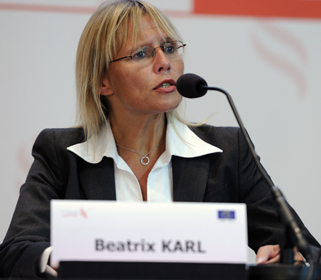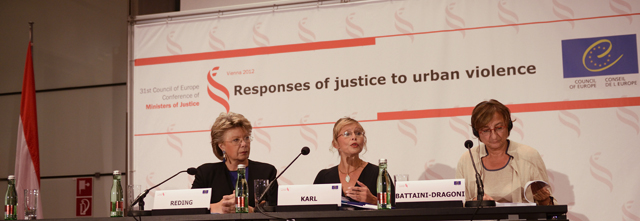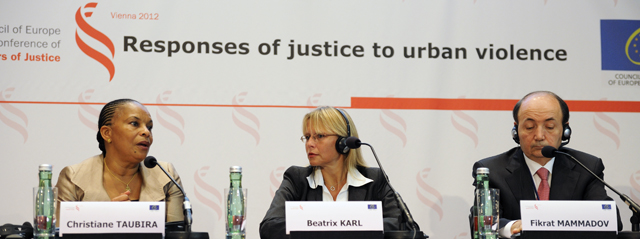The Ministers of Justice of the 47 Council of Europe member states met on 20 – 21 September at Vienna Hofburg Congress Centre to discuss how the judicial system can handle urban violence, in particular in the case of organised groups using Internet-based tools and instant messaging:
 The Ministers proposed, in a resolution, rapid, tailored, effective responses by the judicial system to juvenile perpetrators and victims of offenses.
The Ministers proposed, in a resolution, rapid, tailored, effective responses by the judicial system to juvenile perpetrators and victims of offenses.
Three Press conferences were held during the conference: On Sep. 19 2012, a press conference was held at 7 pm with Mme. Beatrix Karl, Federal Minister of Justice of Austria and Viviane Reding, Vice-President of the European Commission responsible for Justice, Fundamental Rights and Citizenship.
On Sep. 20 2012, a press conference was held where the “European Commission for the Efficiency of Justice of the Council of Europe” (CEPEJ) presented its 2012 report on the evaluation of European judicial systems. The report contains comparative tables and relevant comments about fields such as public expenditure devoted to the judicial system, the legal aid system, mediation, organisation of jurisdictions and the court network, judicial staff and the gender issue, case-flow management in courts, the use of new technologies in judicial procedures (e-justice and e-court) and length of procedures as seen in the various member states. Speakers were the Austrian Minister of Justice Ms. Beatrix Karl, the French minister of Justice Ms. Christiane Taubira, the Justice Minister of Azerbaijan Mr. Fikret Mammadov, the President of CEPEJ Mr. Jean Paul Jean and the CEPEJ Secretary and vice president of CEPEJ Mr. George Stawa.

Concluding the conference, the Austrian Justice Minister Karl and the French Minister Taubira stated that “The 31st Council of Europe Conference of Ministers of Justice highlighted the Corruption. The corruption was a major subject during the conference session and that there strict recommendations unanimously adopted by the ministers in this regard”.
The
European Commission for the Efficiency of Justice (CEPEJ) is entrusted by the Committee of Ministers of the Council of Europe with proposing concrete solutions, suitable for use by Council of Europe member states for promoting the effective implementation of existing Council of Europe instruments relating to the organisation of justice (normative “after sale customer service”), ensuring that public policies concerning the courts take account of the needs of users of the justice system and helping to reduce congestion in the European Court of Human Rights by offering states effective solutions prior to application to the Court and preventing violations of Article 6 of the European Convention on Human Rights.
The CEPEJ is today a unique body for all European States, made up of qualified experts from the 47 Council of Europe member states, to assess the efficiency of judicial systems and propose practical tools and measures for working towards an increasingly efficient service to the citizens.
The CEPEJ aims to provide policy makers and justice professionals a practical and detailed tool to better understand the operation of the public service of justice in Europe in order to improve its efficiency and its quality in the interest of 800 million Europeans.
The CEPEJ has highlighted the numerous methodological problems encountered and the choices which have been made. It is advisable to refer to them constantly to avoid hasty analyses and meaningless conclusions. Comparing quantitative figures from different states or entities, with different geographical, economic, and judicial situations is a difficult task which must be addressed cautiously.
To compare the judicial systems of various states, it is in particular necessary to highlight the specificities which explain variations from one state to another (level of wealth, different judicial structures, data collection). A detailed attention was paid to the terms used and to the definition and use of concepts, which were specified with the national correspondents entrusted with the coordination of data collection in the states or entities. Only a careful reading of the report and a rigorous comparison of data can make it possible to draw analyses and conclusions. Figures cannot be passively taken one after the other, but must be interpreted in the light of the methodological notes and comments.
Comparing is not ranking. But each rigorous reader has with this report a sum of data and methodological elements for an in-depth study by choosing relevant clusters of states or entities: according to the characteristics of the judicial systems (for instance civil law and common law entities; countries in transition or with old judicial traditions), geographical criteria (size, population) or economic criteria (for instance within or outside the Euro zone). The size of the states or entities is also a discriminating element. Thus, the smallest states of the Council of Europe (Andorra or Monaco) cannot be compared according to a scale “per 100.000 inhabitants”.
Possibly related posts (automatically generated):
- Mossad Does Israel know that the mossad offers free lessons in international organized terror and crimes to all rebels and radical...
- Journalism … Terror Laws IFJ President Jim Boumelha, flanked by EFJ President Arne König and IFJ General Secretary Beth Costa at the opening...
- UN General Assembly Debate 66th Session Statement by H.E. Mr. Mahmoud Abbas President of the State of Palestinian Chairman of the Executive Committee of the Palestine...
- Where Are The EU Sanctions Against Israeli Crime? While the European Union supports the continuity of the Zionist occupation in Palestine, turning a blind eye to the...
- Our Spring Blossoms Our Return بدء الاستعدادات لمؤتمر فلسطيني أوروبا العاشر في العاصمة الدنماركية كوبنهاغن 10th Palestinians in Europe Conference launches in Denmark The...

 The Ministers proposed, in a resolution, rapid, tailored, effective responses by the judicial system to juvenile perpetrators and victims of offenses.
The Ministers proposed, in a resolution, rapid, tailored, effective responses by the judicial system to juvenile perpetrators and victims of offenses.










No comments:
Post a Comment